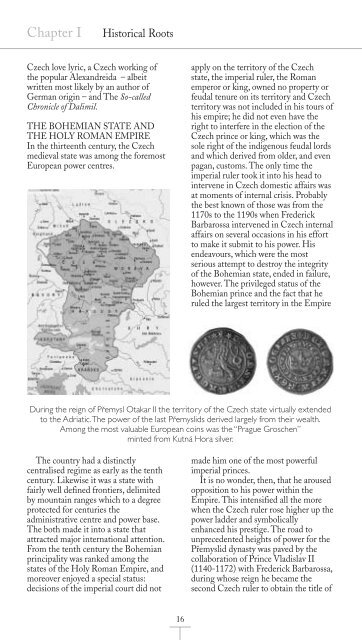the nationality of all inhabitants of the czech provinces and ...
the nationality of all inhabitants of the czech provinces and ...
the nationality of all inhabitants of the czech provinces and ...
Create successful ePaper yourself
Turn your PDF publications into a flip-book with our unique Google optimized e-Paper software.
Chapter I Historical Roots<br />
Czech love lyric, a Czech working <strong>of</strong><br />
<strong>the</strong> popular Alex<strong>and</strong>reida – albeit<br />
written most likely by an author <strong>of</strong><br />
German origin – <strong>and</strong> The So-c<strong>all</strong>ed<br />
Chronicle <strong>of</strong> Dalimil.<br />
THE BOHEMIAN STATE AND<br />
THE HOLY ROMAN EMPIRE<br />
In <strong>the</strong> thirteenth century, <strong>the</strong> Czech<br />
medieval state was among <strong>the</strong> foremost<br />
European power centres.<br />
During <strong>the</strong> reign <strong>of</strong> Pfiemysl Otakar II <strong>the</strong> territory <strong>of</strong> <strong>the</strong> Czech state virtu<strong>all</strong>y extended<br />
to <strong>the</strong> Adriatic.The power <strong>of</strong> <strong>the</strong> last Pfiemyslids derived largely from <strong>the</strong>ir wealth.<br />
Among <strong>the</strong> most valuable European coins was <strong>the</strong> “Prague Groschen”<br />
minted from Kutná Hora silver.<br />
The country had a distinctly<br />
centralised regime as early as <strong>the</strong> tenth<br />
century. Likewise it was a state with<br />
fairly well defined frontiers, delimited<br />
by mountain ranges which to a degree<br />
protected for centuries <strong>the</strong><br />
administrative centre <strong>and</strong> power base.<br />
The both made it into a state that<br />
attracted major international attention.<br />
From <strong>the</strong> tenth century <strong>the</strong> Bohemian<br />
principality was ranked among <strong>the</strong><br />
states <strong>of</strong> <strong>the</strong> Holy Roman Empire, <strong>and</strong><br />
moreover enjoyed a special status:<br />
decisions <strong>of</strong> <strong>the</strong> imperial court did not<br />
16<br />
apply on <strong>the</strong> territory <strong>of</strong> <strong>the</strong> Czech<br />
state, <strong>the</strong> imperial ruler, <strong>the</strong> Roman<br />
emperor or king, owned no property or<br />
feudal tenure on its territory <strong>and</strong> Czech<br />
territory was not included in his tours <strong>of</strong><br />
his empire; he did not even have <strong>the</strong><br />
right to interfere in <strong>the</strong> election <strong>of</strong> <strong>the</strong><br />
Czech prince or king, which was <strong>the</strong><br />
sole right <strong>of</strong> <strong>the</strong> indigenous feudal lords<br />
<strong>and</strong> which derived from older, <strong>and</strong> even<br />
pagan, customs. The only time <strong>the</strong><br />
imperial ruler took it into his head to<br />
intervene in Czech domestic affairs was<br />
at moments <strong>of</strong> internal crisis. Probably<br />
<strong>the</strong> best known <strong>of</strong> those was from <strong>the</strong><br />
1170s to <strong>the</strong> 1190s when Frederick<br />
Barbarossa intervened in Czech internal<br />
affairs on several occasions in his effort<br />
to make it submit to his power. His<br />
endeavours, which were <strong>the</strong> most<br />
serious attempt to destroy <strong>the</strong> integrity<br />
<strong>of</strong> <strong>the</strong> Bohemian state, ended in failure,<br />
however. The privileged status <strong>of</strong> <strong>the</strong><br />
Bohemian prince <strong>and</strong> <strong>the</strong> fact that he<br />
ruled <strong>the</strong> largest territory in <strong>the</strong> Empire<br />
made him one <strong>of</strong> <strong>the</strong> most powerful<br />
imperial princes.<br />
It is no wonder, <strong>the</strong>n, that he aroused<br />
opposition to his power within <strong>the</strong><br />
Empire. This intensified <strong>all</strong> <strong>the</strong> more<br />
when <strong>the</strong> Czech ruler rose higher up <strong>the</strong><br />
power ladder <strong>and</strong> symbolic<strong>all</strong>y<br />
enhanced his prestige. The road to<br />
unprecedented heights <strong>of</strong> power for <strong>the</strong><br />
Přemyslid dynasty was paved by <strong>the</strong><br />
collaboration <strong>of</strong> Prince Vladislav II<br />
(1140-1172) with Frederick Barbarossa,<br />
during whose reign he became <strong>the</strong><br />
second Czech ruler to obtain <strong>the</strong> title <strong>of</strong>


